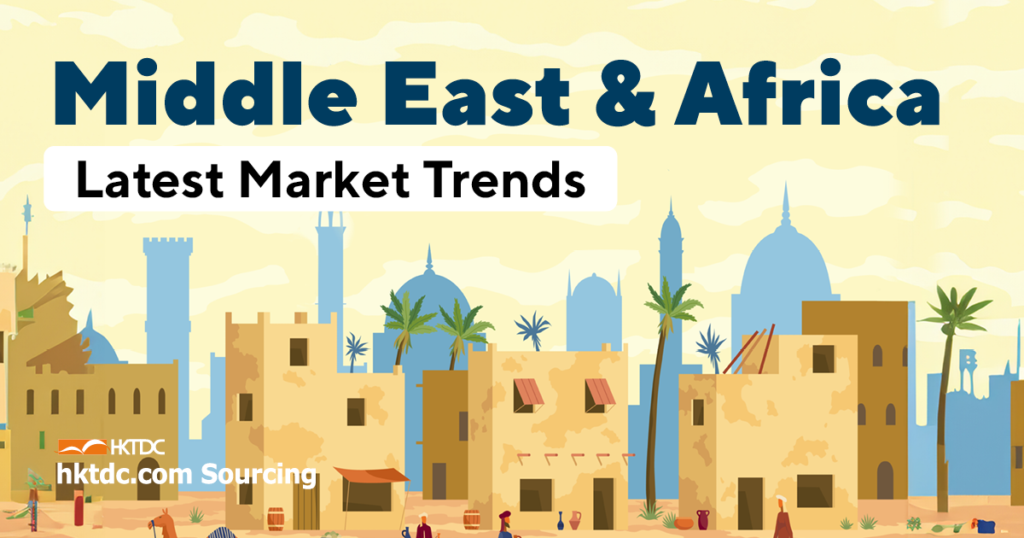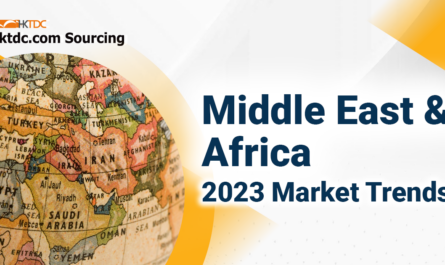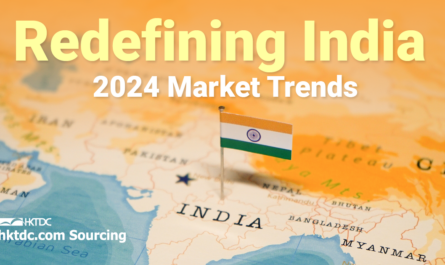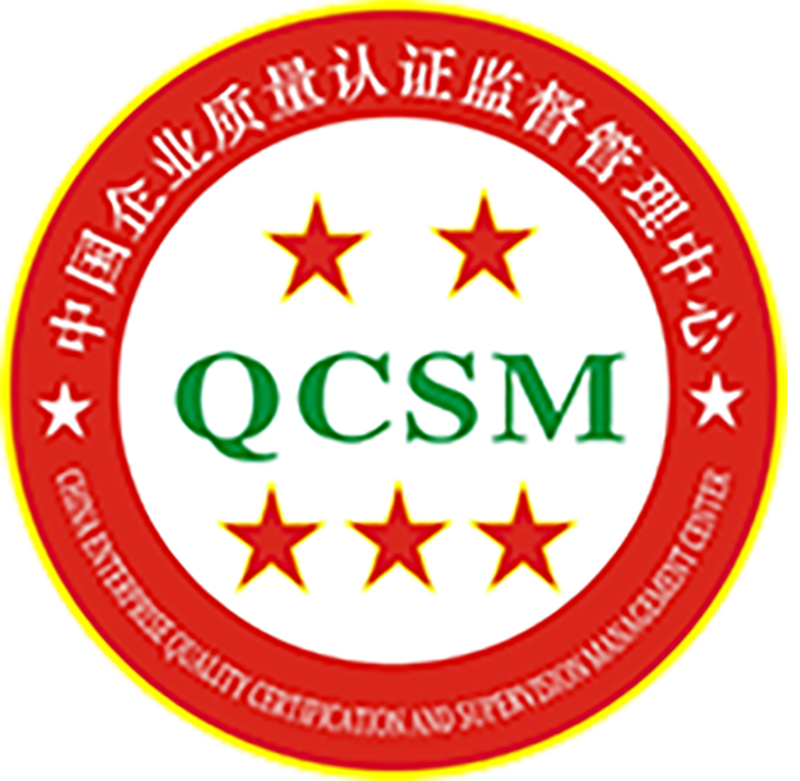While Africa is home to a population almost twice that of Europe, the GDP of the entire continent is roughly one-tenth of the EU nations combined. That being said, the economic influence of African countries has become increasingly present on the world stage, with nations like Ethiopia being on the list as one of the fastest-growing economies in the world.
On the other hand, the Middle East is home to some of the most developed economies. Middle East is famous for petroleum exporters like Saudi Arabia, Iraq, and the UAE, and many of these countries are reinvesting oil profits for a greener world. The region is also home to a significant auto exporter, Turkey, and a world-class tech industry led by Israel.
Learn more about the trends affecting the Middle East & African regions for the upcoming year in the article below.
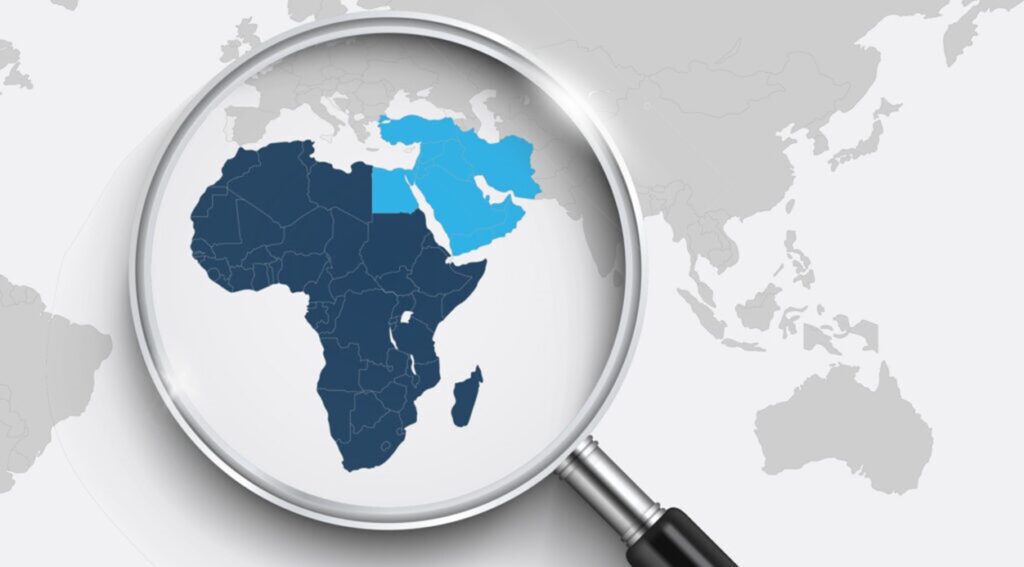
Middle Eastern Countries to Focus on Technological Development
One of the most impactful developments in the Middle Eastern countries is the commitment to economic diversification to prevent the region’s economy from being only led by oil production. For example, the Kingdom of Saudi Arabia (KSA) is in the midst of a historic normalization process with Israel, which would potentially offer Saudi Arabia valuable expertise in expanding its tech industry.
Similarly, UAE tech development is expected to proliferate because of one major factor – a series of Comprehensive Economic Partnership Agreements (CEPA) that provide various cooperations with different countries worldwide. For instance, the CEPA agreement between UAE and India has promised the UAE access to upgrades in technology, with India exporting their tech-related services and setting up facilities to benefit the UAE.
Learn More:
2024 Outlook for India: Trading with Stronger International Ties

Generative AI to Dominate Middle East and African Markets
The prevalence of generative AI (gen AI) has tremendously progressed worldwide in the past months – especially in the Middle East and African markets. In the past year, gen AI has been deeply woven within the consumer’s life in these markets – with an expectation of AI development soaring at a CAGR of 37% and investments to reach 7.2 billion by 2026.
Reports indicate that Middle Eastern and African consumers will be integrating gen AI in their daily decision-making for product purchases, where consumers will be asking AI for its recommendations, especially for the fashion industry. Market experts expect to see many businesses working within these markets to integrate gen AI solutions to have better interaction and service providing to stand out from their competitors.

Sustainability and ESG Continues to Gain Momentum
With the help of government promotion and global awareness, consumers in the Middle East and African markets have been increasingly conscious of the importance of sustainability and ESG when conducting investments with businesses and purchasing products. According to a recent literature review published in the American Journal of Economics and Business Innovation, ESG and sustainability participation significantly impacted business performance, investment decisions, and employee satisfaction for Middle East and African companies.
For consumers in the market, sustainability has become at the top of their minds – where consumers are willing to spend up to 31% more on hospitality companies with sustainable practices. Furthermore, according to research from Nielsen, almost all Middle Eastern and African consumers are doing something to live sustainably – such as paying attention to sustainable packaging and using reusable shopping bags, reducing waste and consuming more non-processed goods – these changes in lifestyles rose considerably due to the increasing visibility of pollution and impact of climate change such as extreme weather in their countries. 76% of shoppers believe businesses must reduce their environmental footprint, indicating that companies must adopt sustainable practices to continue their competitive edge in the future.

Turkey to Enter EV Export Market
Being the world’s 18th largest auto exporter with record exports above $30 billion, Turkey’s auto industry consists of branches of foreign companies that use Turkey’s low labour price to export cheap models back to Western European countries. However, in recent years, domestic Turkish automakers are seeking to diversify their countries’ auto industry roles and want to develop their markets individually. For example, price-competitive, Turkish-built-and-designed electric vehicles are entering the market this year. Along with numerous environmental and political factors, experts suggest that Turkish EVs could carve out a respectable share of the global market.
Not only are EVs seeing uniquely strong export growth in recent years, but Turkey has a proven track record of affordable automotive manufacturing. Competitive pricing will be a fundamental advantage amidst high inflation and middling global demand in 2025 and beyond.

The Sky is the Limit
The Middle Eastern and African markets are a treasure for businesses with countless sourcing opportunities – especially in AI development and sustainability. Buyers and suppliers interested in these markets must find credible working partners to expand their business. Credible and verified sourcing platforms such as hktdc.com Sourcing are perfect for finding trustworthy business partners to venture into new markets.
Stay current on the latest trends and explore potential business opportunities by clicking through below banner to our e-Marketplace:
[1] https://research.hktdc.com/en/regulatory-alerts/middle-east-and-africa
[3] https://www.idc.com/getdoc.jsp?containerId=prMETA52130124
[4] https://www.euromonitor.com/article/what-to-expect-from-the-middle-eastern-consumer-in-2024
[6] Elidrisy, Ahmed. (2024). Examining the Impact of ESG on Organizational Performance: The Literature Review on Investment Sectors of the Middle East and North Africa (MENA). American Journal of Economics and Business Innovation. 3. 40-49. 10.54536/ajebi.v3i1.2377.


